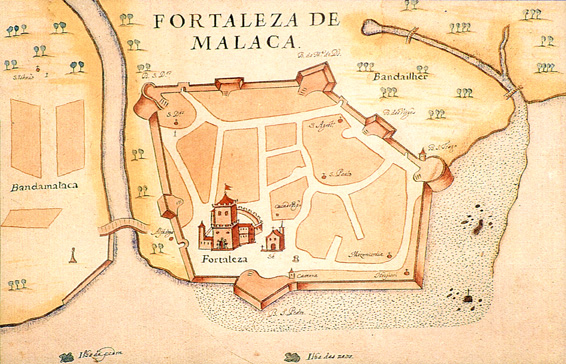There were three Chinese vessels off this island. 1 As soon as ours {i. e., the Portuguese}* arrived the captain of the Chinese came out to meet us in a dexterously manned skiff, accompanied by another honourable man, both of them already aged, seated in wooden chairs, and behind them yet another {man} -- an attendant holding a parasol which protected them from the sun, all accompanied by pipes looking like shawms and emitting a good loud sound. They proceeded straight to the vessel of the Captain-Major, 2 which welcomed them joyfully with trumpets, as well as an artillery display. As soon as they boarded the vessel, they [i. e., the Chinese] went down on their knees and kissed the floor, raising their hands to heaven. Standing up, they saluted the Captain-Major and all the commanders in such manner as to lower their heads with their hands crossed over their breasts. When they had finished this they were invited to sit. And because their language3 was not understandable, a moor from Malacca who knew their tongue was called for assistance. As soon as he arrived much was talked about, {the Portuguese and the Chinese} reciprocally enquiring as to their kings and kingdoms.
They are fair men and of pleasant manners, beardless except around their mouths, small eyed with the lachrymals set apart from the {cane} of the nose, almost black long hair, thin, encapsulated in black silk coifs and, over these coifs, {wear} tall berets which seem to be made of silk with embroidered edges like net. [They] wear tunics and jerkins made from pieces of white estamin under further low waisted pleated jerkins of satin and yellow damask, four fifths in length, with large sleeves abaldocadas, 4 over trousers and boots soled in the moorish style. They say they are Christians, 5 eat all sorts [of] meats, 6 and are accompanied by their wives.
After talking for a long while, the Chinese captain asked the Captain-Major and the commanders to accept an invitation to dine aboard his vessels the following day. Having accepted, they went, to find nine tables all laid but without table cloths. They were requested to seat themselves all along one side and immediately [the tables] were covered with assorted chicken delicacies, tripes, braised and boiled pork, cakes made with honey and sugar, many preserved fruits, many foodstuffs to be eaten in porringers with silver spoons, and plenty of rice wine7 {served} in porcelain {wares}.
They are a people who eat plenty and drink frequently, but a little [at a time], all highly spiced with pickled garlic; and they eat with forks. At the beginning of the meal embroidered napkins were distributed to wipe oneself with, and when the meal was finished a toast was made, until it was time for us {i. e., the Portuguese} to bid farewell. And the Chinese captain kept them company until they reached their vessels afterwards returning to his own.
Translated from the Portuguese by: Fiona Clark
For the Portuguese text, see:
(Anónimo), LOUREIRO, Rui Manuel, intro., Crónica do descobrimento e primeiras conquistas da India pelos portugueses, in "Antologia Documental: Visões da China na Literatura Iberica dos Séculos XVI e XVII", in "Revista de Cultura", Macau, 31 (2) Abril-Junho [April-June] 1997, p. 31 -- For the Portuguese modernised version by the author of the original text, with words or expressions between square brackets added to clarify the meaning.
For the original source of the Portuguese text, see:
ALBUQUERQUE, Luís de, ed., Crónica de descobrimento e primeiras conquistas da India pelos portugueses, Lisboa, Imprensa Nacional Casa de Moeda, 1986, pp.370-37 1 -- Partial transcription.

Fortaleza da Malaca (Malacca's Fortress).
ANONYMOUS.
ca. 1640. Watercolour on paper.
In: SILVEIRA, Luís, ed., Livro das Plantas das Fortalezas, Cidades e Povoações do Estado da Índia Oriental, Lisboa, Instituto de Investigação Ciêntífica Tropical, 1991, p.105.
* Translator's note: Words or expressions between curly brackets occur only in the English translation.
NOTES
Numeration without punctuation marks follow that in the author's anonymous original text selected in Rui Loureiro's edited text in "Revista de Cultura" (Portuguese edition), Macau, 31 (2) Abril-Junho [April-June] 1997, p.31.
The spelling of Rui Loureiro's edited text [Port.] is indicated between quotation marks and in italics《""》-- unless the spelling of the original Portuguese text is indicated.
1 "[...] naus de chineses." (lit.: '[...] naos belonging to Chinese.' or "[...] Chinese vessels [...]"): reference to the Ilha das Naus (lit.: Island of the Naos [Vessels]), facing the harbour of Malacca (presently Melaka).
2 Diogo Lopes de Sequeira [°1466-†1530], fourth Governor of the [Portuguese] State of India, (1518-1522).
3 "língua" [original Port.] (lit.: 'tongue' or 'language'): meaning, 'intérprete' ("interpreter[s]").
4 "abaldocada[s]": an unidentifiable word meaning, possibly means in this context, 'wide, flaired sleeves'.
5 This surprising statement certainly derives from a translation's misunderstanding.
6 The fact that the Chinese "[...] comem toda [a] vianda, [...]" ( "[...] eat all sorts of meats, [...]") was repeatedly emphasised by a number of contemporary Portuguese chroniclers, meaning that the Chinese did not prescribed to any religious dietary restrictions, thus being neither Mussulmans nor Hebrews.
7 "[...] vinho de palma branco [...]" (lit.: '[...] white wine of Palmae [...]'): probably meaning,"[...] rice wine [...]".
start p. 41
end p.